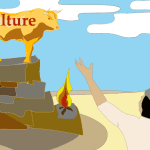According to Laurie Bagby ( Thomas Hobbes: Turning Point for Honor , 5-7 ), Hobbes sets out to “deconstruct” the idea of honor by collapsing it “into what he calls ‘vainglory’ or harmful ‘pride.’”
That’s well and good, depending of course on what we mean by the word “honor.” What Hobbes means becomes clearer in his treatment of martyrdom. Bagby writes, “Hobbes’s views on martyrdom could simply be seen as a part of his overall criticism of other-worldly zeal, which they are. But in the context of the discussion of gentlemen and aristocracy, his treatment of these Christian role models takes on a more significant meaning. Hobbes wishes to undermine any idea of heroism, because it contradicts so dramatically his insistence that fear of death should be the decisive factor in our political and religious choices. The Christian hero is the most significant barrier in the way of Hobbes’s designs, because in his view it is precisely religious zeal . . . which makes men most indifferent to the survival imperative, which makes them go gladly to their deaths.”
Hobbes fails to see that “honor” comes pre-deconstructed by the martyrs, deconstructed by a Christian pursuit of glory that does not take death as a limit but instead hopes for resurrection.














